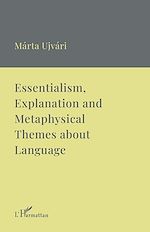
Essentialism, Explanation and Metaphysical Themes about Language
Márta Ujvári
Editeur: Editions L'Harmattan
13,99 €
This collection of essays harvests Ujvári’s previous studies in essentialist metaphysics with particular emphasis on questions of explanation and language imbued by metaphysics. Two chapters were newly written for this volume. The conceptual connections of the papers as chapter-contents are highlighted in the texts. For example, how the special feature of origin properties determine the modal status of sortal specifications; why the central role of explanation creates a need for positing individual essences on top of sortal ones; how the essentialist account of Cambridge changes compete with their mereological account; what the limits of mereology are in metaphysical applications; what the relevance of the Kantian or the Aristotelian conceptual inventories are for themes of current analytic metaphysics, such as the status of conceptual schemes, the scheme-content connection and its holistic reading, the question of the privileged namings of kind essences vs reference under different semantic guises; the metaphysical consequences of vagueness with multi-criteria predicates. Purporting to show the virtues of a modest form of essentialism, mainly with Aristotelian background, a chapter is dedicated to assessing the recent dispute between essentialism and the so-called modalist position.